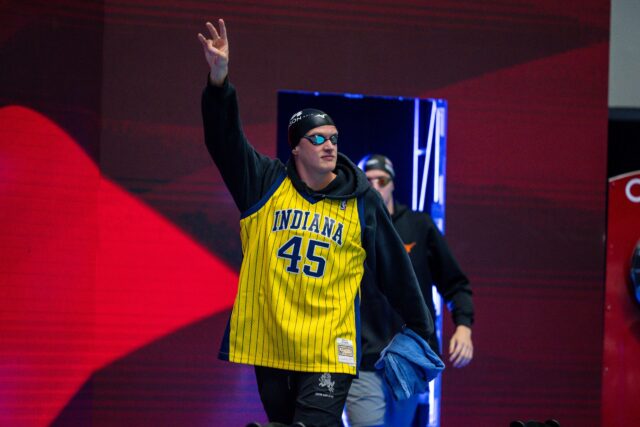By Braden Keith on SwimSwam
Judge Claudia Wilken has approved the final settlement in the House vs. NCAA case in a 76-page opinion released late Friday evening.
The first 39 pages are fairly cut-and-dry, with the interesting topics like filed objections beginning on page 40.
In her opinion, Wilken says that she will not address objections filed by non-class members like parents or coaches like 15-time NCAA champion swim coach Eddie Reese. That leaves her with 73 objections to respond to.
The key point is that Wilken says that the revenue sharing cap has a “reasonable basis for the compromise,” though she leaves the door open to class members being allowed to sue for claims related to the cap on the revenue pool – indicating an interpretation that this settlement doesn’t necessarily end the litigation.
In several cases, Wilken said that there wasn’t enough information or it wasn’t clear if the settlement violates antitrust law, but she also said that this doesn’t mean that the settlement isn’t valid. She did warn the conferences and the NCAA against using the settlement as an antitrust shield.
Wilken also commented on the compromise as it relates to the new NCAA roster limits, which was the biggest concern in the last round of proceedings that Wilken ordered the two sides to negotiate on further.
She specifically argued that the “designated student-athlete” provisions that allow schools to grandfather in current members of teams who would otherwise have been cut due to roster limits because it makes those student-athletes “more valuable to teams” because they allow teams to have larger rosters.
The original complaint over roster limits was that the settlement harmed some class members.
While the new agreement does not require schools to keep these designated student-athletes, many schools, like Notre Dame, have already committed to do so even before Friday’s approval. Wilken said that because current NCAA rules don’t guarantee spots for student-athletes, schools’ existing discretion to decide which student-athletes to have on their rosters maintains that discretion and does not render the settlement “unfair or unreasonable.”
Wilken also pointed to the fact that the settlement agreement offered other protections and benefits for these designated student-athletes impacted by the decision, including that athletes impacted by roster limits won’t lose their athletic scholarships.
As was the case with the roster cap, Wilken acknowledged that student-athletes were not precluded by the settlement from suing over damages arising from the roster limits.
The settlement will pay out $2.576 billion in damages over 10 years: $1.976 billion in NIL-related damages and $600 million for athletic services and pay-for-play damages. In total, over 101,000 class members submitted claims or updated info, which is about 26% of the expected eligible class.
Unpaid funds won’t return to the NCAA.
Schools may allocate up to 22% of average athletic revenue for direct athlete compensation, and there are no more NCAA-mandated scholarship limits (though schools do not have to give full scholarships to every student-athlete). The class includes all NCAA Division I athletes between June 15, 2020 and the end of the 10-year term through the 2034-2035 academic year.
Wilken said that the objectors did not make a good enough case that the damages had to comply with Title IX, but again that they are able to sue over Title IX issues in revenue distributions.
Plaintiff Awards
Grant House, one of six co-lead plaintiffs and the one whose name is most frequently associated with the case, will receive $125,000 under the settlement, as will the other lead plaintiffs Sedona Prince and Tymir Oliver. Others will receive smaller class awards: Nya Harrison and DeWayne Carter will receive $10,000 each, and Nicholas Solomon will receive $5,000.
Those numbers are dwarfed by the amounts requested by the plaintiffs’ attorneys, which still must go through a final approval process.
$395.2M (20%) from NIL fund. $60M (10%) from pay-for-play fund. $20M upfront for injunctive relief work. Up to 1.25% of future “Pool” compensation distributed by schools. ~$9M in litigation expenses.they can also apply to the court or special master “for an award of a percentage of the total amount spent by Division I member institutions under the pool for each academic year (with the percentage increasing from .75 to a maximum of 1.25%” and the right to apply for more fees and costs for “ongoing work in monitoring and enforcing compliance with the Injunctive Relief Settlement.”
While the total sums are staggering, they are in line with attorney’s fees percentages for complex class cases.
The case, which spanned over 4 years, involved millions of pages of discovery and was unusual in both scale and complexity.
Read the full story on SwimSwam: Judge Approves House v NCAA Settlement; Roster Limit Grandfathering Allowed But Not Required
Read More Details
Finally We wish PressBee provided you with enough information of ( Judge Approves House v NCAA Settlement; Roster Limit Grandfathering Allowed But Not Required )
Also on site :
- Albania face Serbia in a World Cup qualifier - where to watch , lineups and predictions
- Bosnia vs. San Marino: live streaming predictions and lineups for World Cup Qualifier
- Bosnia vs. San Marino: predictions and match news for World Cup Qualifier

